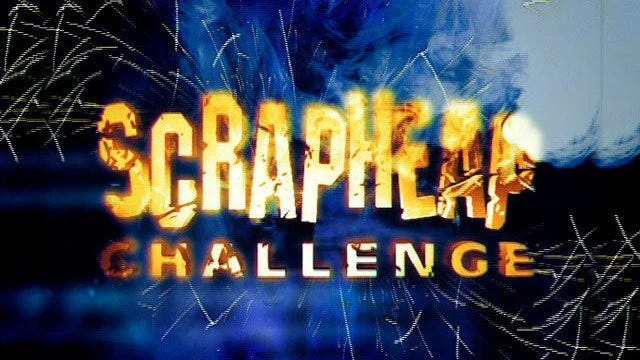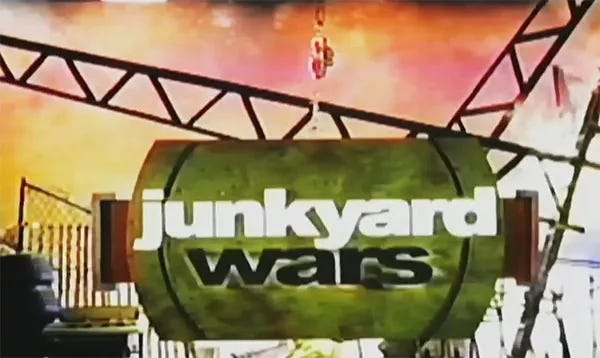Back in 2007, I was very happy to stop working on the long running Channel 4 series Scrapheap Challenge. It had been a blast, 10 years of bodging, cluging, bashing, welding, grinding, cheering, tears, laughter and occasionally, genuinely amazing mechanical engineering made of stuff people had thrown away.
But I had heard enough grinding, seen enough welding (and suffered from arc-eye) and I could tell the media world was changing rapidly and I wanted to be a part of that change.
Ever since then, I have met many dozens of people working in a very wide variety of engineering jobs who have all cited Scrapheap as being the main reason they entered the profession. I’m talking people running the transmission engineering department at Jaguar Land Rover, wing designers at Airbus industries, people who build ships, bridges, trains and massive earth movers.
It’s the only long running TV show I’ve been involved with that has, I think it’s fair to say, had a genuine, positive influence on many of the people who watched it.
There was a sister show called ‘JunkYard Wars’ we made in the USA for the Discovery Channel, exactly the same format but with truly impressive teams of American engineers.
It was a shame it didn’t keep going with other presenters but there are many factors involved in its demise. Here’s my take on how the British TV industry has changed since 2007.
There’s less money spent in the traditional broadcast system the system.
Channel 4 had a very comfortable income from selling advertising that ran in the breaks in their schedule. That advertising budget hasn’t disappeared, it is just spread very thinly across a mind boggling landscape of ‘content’ systems. YouTube being the biggest, but also Instagram, Tik Tok, Facebook and a plethora of smaller niche apps and outlets.
So the traditional broadcast TV companies have had to change along with everyone else. Making a panel show with 4 funny people sitting behind desks, plus one funny host, is cheap to make. Sure, the individuals taking part may receive handsome recompense, but from a technical and logistical standpoint, it’s a cheap show you can churn out, year after year. You can sell either the original show, or the format, around the world and as an independent production company, you could make a mint.
Or you can make a ‘structured reality’ competition show, where an endless crop of new contestant are cajoled into saying whatever the producers want them to say while the resulting footage is edited to tell the story they want to tell.
These are hugely popular productions, we’re all very familiar with the titles and formats and again, I will say, in comparison to making a one off well researched documentary, or a scripted drama series, or indeed, an engineering challenge show with a huge production crew, all the new formats are relatively cheap and easy to produce.
Scrapheap had a production crew of around 50 people, producers, directors, researchers alongside a huge camera crew with camera technicians, sound crew, background engineers, plus the teams and on site catering.
Of course your truly had a massive Winnebago, dozens of fawning staff waiting on me hand and foot, my own chefs, masseurs, make up department, hairdressers and ego consultants.
Oh wait, no, I’ve just remembered. I had nothing, I got changed in an old shed and mucked in with everyone else.
Anyway, all this waffle is to explain that it wasn’t a cheap show to make, which is part of the reason broadcasters are hesitant to re-launch the show.
It wasn’t until last year that we even toyed with the idea of trying to make it again, in some form, without going down the traditional broadcast route.
At Everything Electric London a year ago, one of our keynote guests was Colin Furze, an amazing and very entertaining engineer and incredibly successful YouTuber. Scrapheap was mentioned during the interview and we both received torrents of requests to ‘bring it back’ as news leaked of our discussions
So, after lengthy discussions with many people once associated with the show, and careful budgetary planning we have decided to launch a Kickstarter campaign with a view to shooting two teams of properly skilled engineers making a machine of some sort out of scrap, but instead of using big combustion engines as we always did on Scrapheap, we will use batteries, software and electric motors.
One of the other big differences with the old broadcast format is we will test out and run the competition final with the machines in front of a live audience at Everything Electric in Farnborough from 10th to 12th October this year.
Proper banked seating, safety barriers and massive video screens etc. The resulting show will be released on the Fully Charged Show and Everything Electric show shortly after.
And to use the strapline:
Two teams, two batteries, and a junkyard: what could possibly go wrong?
If you are interested in finding out more, please follow this link.







Sir I must disagree! Red Dwarf also had a genuine, positive influence on many of the people who watched it.
I need 4 honda 90 moped wheels,